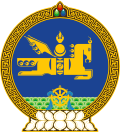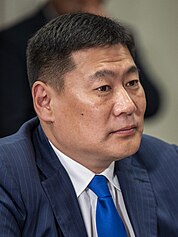Prime Minister of Mongolia
| Prime Minister of Mongolia | |
|---|---|
| Монгол Улсын Ерөнхий сайд (Mongolian) | |
 | |
since 27 January 2021 | |
| Executive branch of Mongolia | |
| Type | Head of government |
| Member of | National Security Council |
| Seat | Government Palace, Ulaanbaatar |
| Appointer | State Great Khural |
| Term length | 4 years; renewable |
| Constituting instrument | Constitution of Mongolia |
| Precursor | Prime Minister of the Mongolian People's Republic |
| Formation | November 1912 11 September 1990 |
| First holder | Tögs-Ochiryn Namnansüren (1912) Dashiin Byambasüren (1990) |
| Deputy | Deputy Prime Minister of Mongolia |
| Salary | 62,102,880 ₮/US$ 18,393 annually (2024)[1][2][3] |
 |
|---|
|
|
The prime minister of Mongolia (Mongolian: Монгол Улсын Ерөнхий Сайд, romanized: Mongol Ulsyn Yerönkhii Said[a]) is the head of government of Mongolia and heads the Government of Mongolia. The prime minister is appointed by the Mongolian parliament or the State Great Khural, and can be removed by the parliament with a vote of no confidence.
The incumbent prime minister is Luvsannamsrain Oyun-Erdene, who has served since 27 January 2021.[4] He replaced Ukhnaagiin Khürelsükh, who was resigned on 22 January 2021.[5]
Powers
The prime minister has full powers to hire and fire cabinet ministers[6] and appoints the governors of the 21 aimags of Mongolia, as well as the governor of the capital, Ulaanbaatar.[7]
History
The office of prime minister was established by the Bogd Khanate of Mongolia in 1912, shortly after Outer Mongolia first declared independence from the Manchu Qing Dynasty. This was not recognized by many nations in the 1910s. By the time of Mongolia's second (and more generally recognized) declaration of independence from the occupation by Beiyang China in 1921, the office was controlled by a communist group known as the time Mongolian People's Revolutionary Party. 1924 the party established the Mongolian People's Republic, and the prime minister's post was superseded by one known by the chairman of the council of people's commissars. This was changed to chairman of the council of ministers in 1946. The title of prime minister was only revived in 1990, when the People's Revolutionary Party gradually released its hold on power. Regardless of the changes of name, however, the modern Mongolian government recognizes the office as having existed continuously since 1912, and counts all holders of the office as prime ministers.[8]
There is some confusion as to the first holder of the office. A lama named Tseren (or Tserenchimed) held office as "prime minister" (actually the Interior minister) during a provisional government, and is sometimes cited as the first holder of the modern office. However, the Mongolian government considers Tögs-Ochiryn Namnansüren, the first formal office-holder, to be the first.[9] There is also some confusion over the status of Tsengeltiin Jigjidjav, some consider him to have only been acting Prime Minister, while some consider him to have been a full Prime Minister. The Mongolian government takes the latter view.[10]
See also
Notes
- ^ Traditional Mongolian script: ᠮᠣᠩᠭᠣᠯ ᠤᠯᠤᠰ ᠤᠨ ᠶᠡᠷᠦᠩᠬᠡᠢ ᠰᠠᠶᠢᠳ
References
- ^ REGARDING THE UPDATE OF THE SALARY RANGE AND MINIMUM RANGE OF CERTAIN CIVIL OFFICES (Government Resolution.128, Appendix 2). Government of Mongolia. 2024-03-27.
- ^ ABOUT THE APPROVAL OF THE COEFFICIENT FOR DETERMINING THE SALARY (State Great Khural Resolution.63, Appendix. List item No.2). State Great Khural. 2019-06-06.
- ^ REGARDING DETERMINATION OF SENIOR STATE OFFICIAL RANK AND EQUIVALENT CIVIL OFFICE RANK (State Great Khural Resolution.19, Appendix). State Great Khural. 2019-02-01.
- ^ "Монгол Улсын 32 дахь Ерөнхий сайдаар Л.Оюун-Эрдэнийг томилов". 27 January 2021.
- ^ "Mongolian prime minister resigns after COVID-19 protests". Reuters. 2021-01-22. Retrieved 2024-06-21.
- ^ Adiya, Amar (2022-05-03). "Mongolia Considers Major Political Reforms". Mongolia Weekly. Retrieved 2022-09-11.
- ^ Montsame News Agency. Mongolia. 2006, Foreign Service office of Montsame News Agency, ISBN 99929-0-627-8, p. 47
- ^ Sureyya, Yigit (August 2021). "Mongolia's Historic Relations with its Largest Neighbour: Russia". Electronic Journal of Social and Strategic Studies. 2 (IV): 9–41.
- ^ Gareth, Harris. "Mongolia mulls restitution claims after identifying objects held abroad". The Art Newspaper. Retrieved 29 December 2023.
These include a letter from around 1921 written by the first prime minister of Mongolia, Tögs-Ochiryn Namnansüren, declaring the country's independence from China's Manchu Dynasty, at present held at the British Library in London. The library says it has not received any enquiries regarding this item to date.
- ^ "China/Mongolia (1911-1946)". University of Central Arkansas. Department of Government, Public Service, and International Studies. Retrieved 2024-02-14.
Prime Minister Tsengeltiin Jigjidjav resigned on July 2, 1932, and Peljidiin Genden was appointed as prime minister.
External links
- Official website of the Mongolian government (in Mongolian)


